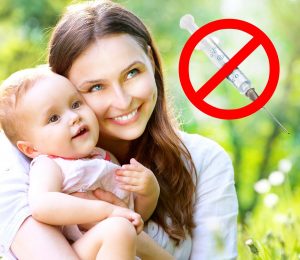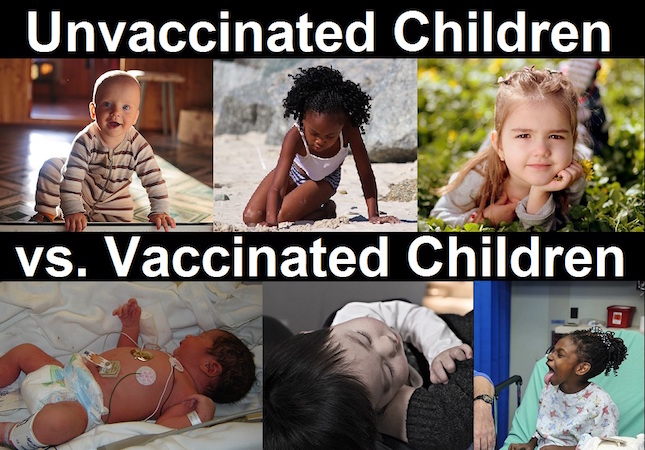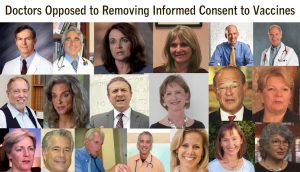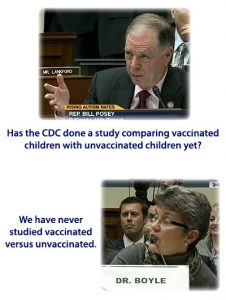This article by Jennifer Margulis, Ph.D. was originally published by Health Impact News
Study: Unvaccinated Children have Less Chronic Disease and a Lower Risk of Autism than Vaccinated Children
A new peer-reviewed study comparing health outcomes of vaccinated and unvaccinated children, provisionally published in the journal Frontiers in Public Health and assigned a DOI number (a digital object identifier given by publishers to identify content and provide a persistent link on the internet), confirmed what parents like Sarah Carrasco have observed: that completely unvaccinated children have less chronic disease and a lower risk of autism than vaccinated children.
The researchers collected health information on over 660 children from a survey conducted in 2012 of mothers of children between six and twelve years old in four states (Florida, Louisiana, Mississippi, and Oregon). According to the abstract, the team of four scientists found that completely unvaccinated children were significantly more likely to get chickenpox and whooping cough but significantly less likely to suffer from ear infections, pneumonia, allergies, and brain or central nervous system disorders, including autism.
- Vaccinated children were more than twice as likely to have some chronic illness.
- Vaccinated children were nearly four times as likely to have learning disabilities, attention deficit hyperactivity disorder, and autism spectrum disorder.
- Vaccinated children who were born prematurely were more than six times more likely to have brain or central nervous system disorders, including autism.
Doctors See Link Between Vaccines and Autism Rates
“We all need to be looking at improving the safety of vaccines,” says Bose Ravenel, M.D., whose practice is based in Winston Salem, North Carolina.
Ravenel, 78, admits that in his long career practicing medicine he used to dismiss the idea vaccines are connected to autism or other health problems in children. But now, after attending autism conferences, researching the peer-reviewed scientific literature, and paying more attention to parents’ experiences, he has changed his mind.
“There is clearly a relationship between vaccines and autism,” Ravenel says. “But to say that ‘vaccines cause autism’ is an inaccurate, non-nuanced statement. At the same time, to say that ‘vaccines don’t cause autism’ is also inaccurate. In certain conditions, like with mitochondrial dysfunction, vaccines certainly can cause autism or contribute to it.”
Ravenel insists that any doctor who does the research, instead of just heedlessly following the recommendations of his professional medical organizations, will come to the same conclusion.
“Any physician who would be willing to look at both sides openly and study it seriously would conclude that the idea that vaccines have been proven not to cause autism is not accurate,” Ravenel says.
Parents With Vaccinated and Unvaccinated Children Notice That Their Unvaccinated Children are Healthier

Unaware that her son’s growing health problems might be related to vaccines, Sarah Carrasco continued to vaccinate, though family members begged her not to.
“I thought I was protecting him,” Sarah explains.
At David’s two-year check-up she mentioned to the doctor that her mother thought it might be safer to delay some vaccines. The doctor became enraged.
“You’re not a doctor, your mother’s not a doctor, you shouldn’t question me,” Sarah remembers him shouting.
David became extremely violent and self-injurious—banging his head against the wall until he bled, hitting himself. At three he was diagnosed with Sensory Integration Disorder and the doctors told her they suspected psychosis. At four and a half, he was diagnosed with autism.
By then Carrasco had another baby, Aidan, who was also being vaccinated, though on a delayed schedule (a different doctor told her it was fine to delay some vaccines as long as he was caught up by the time he went to school).
So Aidan had the vaccine against measles, mumps, and rubella (MMR) at age two, instead of between 12 and 15 months, which is the current CDC recommendation. Immediately afterwards he spiked a fever of 105 and started high-pitched screaming.
“After that, my mom’s like, ‘Are you done now? Are you going to stop doing this to my grandchildren?’” Sarah remembers.
Aidan has since been diagnosed with ADHD and soft teeth, which her dentist told her can be caused by very high fever in early childhood.
So when Sarah’s third son was born almost four years ago, she refused vaccines.
Brooks is a talkative, active, imaginative preschooler who adores his older brothers, loves to play outside, and draws colorful stick figures of The Joker and Harley Quinn. The difference between his health and his older brothers’ is startling.
“It’s the opposite of the older two,” Sarah says. “They always had a sinus infection or an ear infection or a rash—something was always wrong. With this one, he’s been sick twice in his life, I think. Developmentally he’s killing it. He’s in the 95th percentile for everything.”
That doesn’t surprise Kelly Sutton, the doctor based in Fair Oaks, California.
“I hear stories almost every day of families that vaccinate children and then decide not to vaccinate and the unvaccinated children within the same family are healthier, more socially adjusted and more capable academically,” Sutton says.
Allison Rogers, a 29-year-old mom of four in Austin, Texas, has two vaccinated and two unvaccinated children. Allison will never forget the drive to the pediatrician’s office when her oldest was 18 months old.
“I was playing music and singing and I would say, ‘Hudson, shake!’ and he would dance and giggle. That’s the last time I remember him being him,” she says sadly.
After the immunizations, Hudson slept for six and a half hours and could not be roused. Both Hudson and his brother Adler, born 19 months later and also vaccinated, are on the autism spectrum.
Today Hudson is seven years old, disengaged, and non-verbal.
“He isn’t who he was supposed to be. And I know that was because of vaccines. I know that vaccination singlehandedly tipped him over into autism,” Allison says.
Like Sarah, when Allison became pregnant for the third time, she decided not to do any vaccines. Her completely unvaccinated four year old, Graham, and her unvaccinated 15-month old, Beckett, are both in excellent health and neurotypical. Allison is sure that it is not a coincidence.
Vaccine Safety Censorship
Are parents like Sarah Carrasco and Allison Rogers “irresponsible,” “selfish,” and “crazy,” as the mainstream media proclaims? Are the hundreds of medical doctors and other health care practitioners now voicing concerns over the current CDC vaccine schedule and delaying vaccines for their own families “quacks” who should lose their medical licenses?
Stanford graduate J.B. Handley, a successful entrepreneur who has a child affected by autism, says no.
“There is no parent on the planet fighting for vaccine safety who doesn’t want to protect their children from deadly diseases,” claims Handley, co-founder of Generation Rescue, a non-profit that supports families affected by autism. “But the current vaccine program is an overreach. We absolutely need a reset.”
Neuroscientist Rene Anand, Ph.D., is a professor in the Department of Chemistry and Pharmacology at Ohio State University’s medical school who is researching how the environment and genes interact to increase susceptibility to brain disorders. Anand—who is quick to credit vaccines with saving millions of lives and to point out he is pro-vaccine—insists it is not scientifically accurate to disregard the possibility that vaccines may be triggering autism in genetically susceptible children.
Given the fact that so many parents report witnessing a decline in their children’s immune systems and cognitive functioning directly following vaccination, the possible connection, Anand says, must be thoroughly investigated.
Tommy Redwood, M.D., an emergency room doctor based in Atlanta, Georgia who has been practicing medicine for 26 years, suspects over-vaccination is playing a causal role in poor health outcomes among today’s children. Instead of trying to force vaccine compliance among vaccine-hesitant families, Redwood believes the medical community needs to appropriately and reasonably address parents’ concerns.
“A lot of physicians just want to dismiss the concerns parents have,”
Redwood says, adding that he thinks ignoring parents’ observations is a mistake, and that the most responsible medical doctors always listen carefully to their patients.
“If you don’t ask the right questions, you can’t find the right answers,” Redwood continues. “If you summarily dismiss the possibility that the increasing rates of childhood illnesses, including ADD, autism, asthma and other auto-immune disorders are connected to vaccines, you can’t figure out if our children’s health problems are vaccine-related injuries. The people at CDC who should be helping set policy on vaccine safety—I don’t think they are asking the right questions.”
Like Redwood, children’s health advocates, vaccine safety activists, and medical professionals have been calling for a well-designed publicly funded large-scale study comparing completely unvaccinated children with fully vaccinated children for years.
So far the government has refused.
Even when well-designed small-scale privately funded studies are conducted, you may never read them.
The study I cited earlier passed the rigorous peer-review process and had been accepted for publication. But just a few days after the abstract was posted on-line, it was pulled by the journal’s editor without explanation.
About the author: Jennifer Margulis, Ph.D., is an award-winning science journalist and book author. A Fulbright grantee and sought-after speaker, she has been researching and writing about issues related to children’s health for over ten years. She is the author of Your Baby, Your Way and the co-author (with Dr. Paul Thomas, M.D.) of The Vaccine-Friendly Plan. Dr. Paul Thomas has over 13,000 patients in his integrative practice in Portland, Oregon; about ten percent of whom are unvaccinated. “As unpopular as this observation might be, my unvaccinated children are by far the healthiest,” he says.










